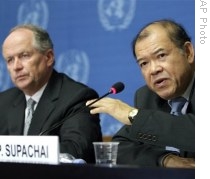Geneva
17 September 2009
The U.N. Conference on Trade and Development, or UNCTAD, reports that global foreign direct investment fell drastically last year and that it is expected to continue to slide this year, with significant recovery not forecast until 2011. But the UNCTAD World Investment Report 2009 says developing countries are doing better in attracting foreign direct investment, or FDI, than the developed countries.
The report estimates that foreign direct investment inflows will fall from $1.7 trillion in 2008 to less than $1.2 trillion this year. But it is expected to pick up slowly next year and gather momentum in 2011, approaching $1.8 trillion.
 |
| UNCTAD Secretary-General Supachai Panitchpakdi, right, and UNCTAD Director of the Division on Globalization and Development Strategies Heiner Flassbeck (File) |
Nevertheless, the report says the United States remains the world's largest recipient of foreign direct investment, followed by France, China, the United Kingdom and the Russian Federation.
In previous years, cross border mergers and acquisitions were a major source of growth of FDI. These too, says the report, have declined considerably as financial markets seized up in the second half of 2008.
The report notes a general absence in projectionist policies despite the global economic recession. But UNCTAD Secretary-General, Supachai Panitchpakdi says governments have pursued trade policies favorable to domestically-produced goods and services.
"There are examples of the so-called 'covert protectionism,' which includes something like, as you can see, you know buy local, hire local, invest local, lend local, do anything local," he said. "So some of this economic nationalism trend favoring products with high domestic content with regard to government procurement. And you can see this is greatly linked to the stimulus measures, particularly in areas of public infrastructure projects."
The UNCTAD report also focuses on agriculture, including the crucial issues of fighting hunger, promoting food security and fostering sustainable agricultural development as a pre-requisite for economic growth.
The report says foreign direct investment can play a major role in helping developing countries enhance their agricultural sectors.
Supachai Panitchpakdi says investment funds from private sources could help spark a green revolution in Africa.
"FDI by itself would not be able to do all this," said Supachai. "But I am sure it would help to give impetus to the government policies, to support government policies in areas that technology would be needed, to help create employment that would instill the sense of belief in the farming sector that could give the livelihood to the people and therefore people would remain involved in farming activities."
The UNCTAD Secretary-General says the green revolution in Asia during the 1960s was triggered when fertilizer, seeds and farming technology became readily available. He says Africa could achieve similar results if it invests private money into the technologies needed to increase food production in an environmentally sustainable way.